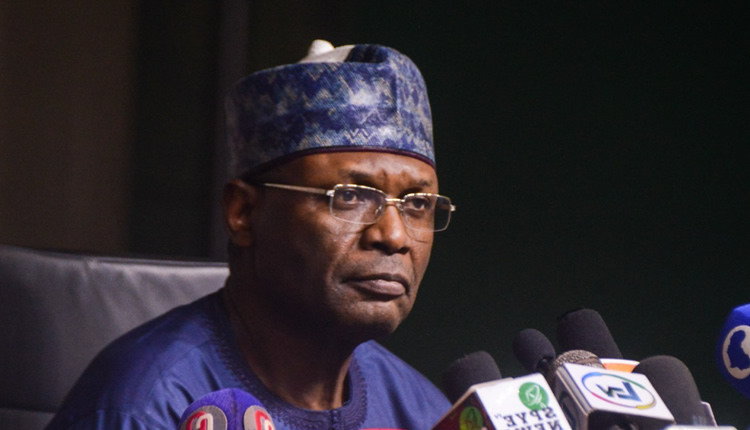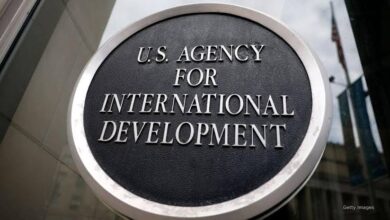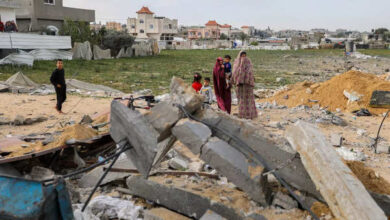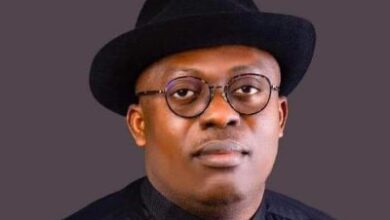2027: INEC Rekindles Debate on Voting Rights for Prison Inmates

The Independent National Electoral Commission (INEC), last week, instigated a fresh political debate by reopening the usual controversial, highly contentious, and sensitive proposal concerning the need for prison inmates to exercise the right to vote during every major general election.
The debate on the fresh proposal, usually a source of deliberation ahead of the main elections, has expectedly overshadowed and shifted the attention of many political watchers from the National and State Assembly by-elections scheduled in 12 states this weekend and even the commencement of the Continuous Voter Registration (CVR) taking place in 811 centres across the country.
The issue of prison inmates voting formed the nucleus of the discussions during last week’s meeting between the chairman of the electoral umpire, Prof Mahmood Yakubu, and the Controller General (CG) of the Nigerian Correctional Service (NCoS), Sylvester Ndidi Nwakuche, in Abuja.
Nwakuche, in his remarks during the meeting, described the inmates as a community that may have been underserved and unnoticed despite their potential contributions to national development.
To buttress his claims, the CG had argued that it is highly unfair and insensitive to ignore a segment that currently holds over 81,000 inmates, with 66 per cent of that number on the awaiting trial list, presumed innocent under the law, out of the voting public, adding that incarceration alone should not be the reason to extinguish their civic rights, citing both court rulings and a recent resolution of the National Assembly in support of inmates voting.
According to him; “I am here, Chairman, to see how we can work together, even if it is not now, then in the nearest future, to grant these inmates the right to vote. What are the things needed from our side as Correctional officers? What are the things needed from your side?
“We must ensure that these people are not denied their rights. The inmates voting is not only about rights, but also about the dignity of citizenship and the principles of inclusivity in a democracy,” he added.
But this is not the first time such a request is being made. In retrospect, the ever-recurring debate surrounding prison inmates’ voting has led to the Senate passing a resolution at its plenary on March 8, 2022, calling on the electoral umpire to allow duly registered and eligible prison inmates to vote during all general elections in Nigeria
The Senate then equally urged the commission, in collaboration with the Correctional Service, to locate polling units at custodial centres across the country to be used for voting.
With the benefit of hindsight, this fresh request was also in line with the previous rulings by both the Federal High Court and Appeal Court, just as it is equally in tandem with the practice in some African countries like Ghana, South Africa, and Kenya.
Daily Sun recalls that on December 16, 2014, and December 7, 2018, a Federal High Court and a Court of Appeal, respectively, both in Benin, had delivered judgments about the right to vote by five plaintiffs awaiting trial at the time.
Relying on the combined provisions of Article 25 of the International Convention on Civil and Political Rights (1966) and Section 25 of the Constitution of Nigeria 1999 (as amended) on citizenship, the courts had affirmed the rights of plaintiffs who were inmates awaiting trial to vote in elections.
However, the apprehension already in many quarters against the fresh proposal is that the Nigerian electoral system has not shown enough capacity to respond to certain issues and concerns, as evidenced in the previous vote on the National Assembly’s Constitution review bills, where the bill for diaspora voting was thrown out.
Again, recall that ahead of the 2015 general elections, INEC had set up a Task Force to make arrangements for voting by the Internally Displaced Persons (IDPs) and developed a new framework for IDP voting in 15 states for the elections in 2019. But it ran into hitches because while the IDPs residing in camps within their states of registration (intra-state IDPs) could vote at all elections, those residing in camps outside their states of registration (inter-state IDPs) could only vote at the presidential election.
INEC in defence then claimed that it was to limit challenges associated with political perception and suspicion over transmission of results across state borders and constituency boundaries. If the electoral commission succeeds in developing policy for the prison inmates to vote in the forthcoming 2027 general elections, there is also every possibility that the limitations with the IDP voting in 2019 may still come into play.
Expectedly, the fresh appeal by the NCoS CG to allow prison inmates in Nigeria to participate in elections has understandably sparked fresh significant debate, specifically given the country’s current electoral landscape.
According to the proponents of the proposal, being a prison inmate ought not to deprive Nigerian citizens of the franchise to participate in elections to decide who emerges as the elected leaders of the country.
According to them, it is even more instructive that the numerical strength of the prison inmates across the country currently stands at 81,000, which holds an insignificant number of voters to decide the eventual outcome of the presidential election, for instance.
But curiously, is the disposition of the 66 per cent on the awaiting trial prison inmates to vote after been abandoned and neglected inside the prison custody for several years without any serious attempts to review their litigations.
The unresolved questions are whether the inmates, like the Boko Haram insurgents and bandit kingpins on the awaiting trial lists that don’t recognise the legitimacy and authority of the state, will be equally humble and submit themselves to the demands of exercising such voting rights.
But, more importantly, is the fact that while the idea of extending voting rights to incarcerated individuals may be seen as a progressive step, Nigeria’s unique election challenges may make its implementation highly problematic.
In a country where there is a disturbing increase in voting apathy, many election observers believe that it would be easier and more productive for the electoral commission to embark on an aggressive awareness campaign to enlighten and mobilise the electorate than struggling to surmount the litany of obstacles against prison inmates with such insignificant number of voting strengths.
Another question confronting the realisation of the proposal is that the country is still struggling to establish a robust, trustworthy, and secure voting system for the general population, with issues like electoral fraud, logistical failures, and voter suppression.
Re-echoing the apprehensions in the minds of many concerned Nigerians and election observers, INEC chairman, Prof Mahmood Yakubu, warned that due to some procedural, logistic, legal, and legislative issues and pending requirements, the realisation of it will clearly not going to be a walk in the park.
The electoral umpire boss also emphasised that though the commission has set up a joint technical committee to review all the issues involved and advice on the way forward, the intervention of the National Assembly to smoothen the legislative perspective and legal encumbrances would be the icing on the cake.
While enumerating the procedural measures, Prof Yakubu said: “You availed us of data on the locations and types of federal correctional facilities nationwide. You also provided us with statistics on the various categories of inmates, the majority of whom are on remand awaiting trial and who may actually be registered voters.
“On our part, we raised the issue of access to the correctional facilities for voter registration, creation of polling units, and voter education. On behalf of stakeholders and for transparency, we also brought to your attention concerns about access to your facilities for observers and the media.
“Political parties also want to know if they will be allowed to campaign in the correctional facilities and appoint polling agents on election day. We believe that working together with you and the stakeholders, we can address these concerns,” he said.
Equally interrogating the feasibility of the arrangements further, the INEC boss noted: “As you are aware, an election is a process governed by law. Working together, we can seize the opportunity of the ongoing electoral reform for a clear legal provision that will specifically cover citizens serving time in our correctional facilities.
“Doing so will also clarify the provision of Section 12(1)(e) of the Electoral Act 2022 on voter registration, a precondition for voting in elections, which restricts the exercise to a Nigerian citizen who ‘is not subject to any legal incapacity to vote under any law, rule or regulations in force in Nigeria.’
“There are various interpretations as to whether this provision relates to inmates on death row, those serving life sentences, or those convicted for treason. Our immediate task is to engage with the National Assembly for a clear legal provision on inmates voting. Thereafter, we can address the specific issues that may arise in the course of implementation,” he suggested.
Despite the highlighted teething challenges, Prof Yakubu, in his assurance on the workability of the proposal, said: “I wish to reassure the CG of NCoS that we are united with you in our shared determination to extend voting rights to inmates of our correctional facilities. A meeting like this goes a long way in reaffirming our resolve in this regard.”
On the flipside, if the challenges are resolved, and the election officials, observers, media, political parties and the candidates were permitted to interact with the inmates, there is likelihood that it will bring goodwill to the inmates, especially the awaiting trial ones who will seize the opportunity to implore the visitors to the prison yard to intervene on their cases.
However, weighing in on the issue and looking beyond the request, the National Secretary of the Coalition of United Political Parties (CUPP), Peter Ameh, in a chat with Daily Sun, raised serious doubts on the workability of the proposal.
He argued that “without a reliable electoral framework for non-incarcerated citizens, expecting a secure and transparent voting process within prison custody seems overly ambitious and unrealistic. One of the primary concerns with this proposal is the high risk of government interference and manipulation. “
“Nigerian prisons are wholly dependent on the government for funding, management, and inmates’ welfare, creating an environment ripe for coercion. Prison authorities, under government influence, could manipulate the voting process to favour ruling parties or specific candidates. Inmates, already in a vulnerable position, might face victimisation or intimidation if their votes do not align with the interests of those in power,” he added.
Ameh, a Labour Party (LP) chieftain, equally noted that the ruling party could use coercive instruments like “withholding essential services like food, healthcare, or other forms of care from inmates in facilities where election results do not favour the ruling administration.
“This dynamic undermines the principle of free and fair elections, as inmates may feel pressured to vote in ways that ensure their basic needs are met. More importantly, the proposal raises concerns about the potential misuse of voting rights as a tool for political manipulation.
“The government could exploit the voting process in prisons as a mechanism to reward loyalty or secure clemency for inmates who support the ruling party. Such a system risks turning voting into a transactional act rather than a democratic right, where inmates might be coerced into voting for certain candidates in exchange for promises of reduced sentences or improved treatment. This not only erodes the integrity of the electoral process but also perpetuates a culture of patronage and corruption, further undermining Nigeria’s democratic institutions. Nigeria currently lacks the infrastructure to support such an ambitious initiative,” he said.
THE SUN





